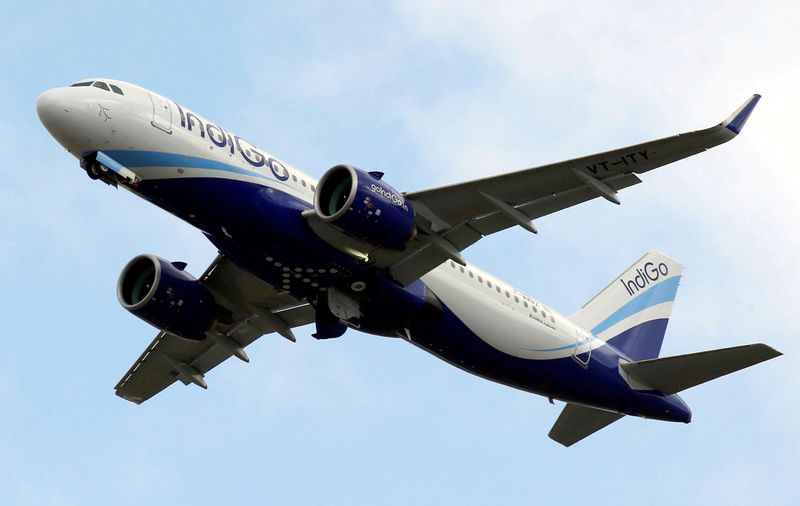By Aditi Shah and Jamie Freed
NEW DELHI (Reuters) -India's airlines are under renewed pressure to raise cash or face the risk of having to downsize, consolidate or have their planes repossessed by lessors as a surge of COVID-19 infections roils travel.
Passenger traffic fell by nearly 30% in April from a month before and has halved again so far in May, forcing even the country's biggest and most cashed-up carrier, IndiGo, to act.
IndiGo's parent, Interglobe Aviation, met on Friday to consider an equity raising, just months after it abandoned plans to raise up to 40 billion rupees ($543 million) in January in response to a speedy recovery in travel.
InterGlobe's board has decided to continue exploring all options to increase liquidity, including by way of a share sale to institutional investors, the company told the stock exchange.
With traffic plummeting, according to aviation ministry data, IndiGo's cash burn is expected to rise to $3.4 million a day - a level last seen in September - from $2 million a day at the end of 2020, an analyst who tracks the company said.
This means IndiGo, which has more than a 50% share of the market, may look to raise $543 million to $679 million amounting to at least two quarters of cash burn, said the analyst, who declined to be named as he was not authorised to speak publicly.
While IndiGo is seen as a survivor, the situation is worse for smaller carriers, particularly those without large backers, some of which were struggling before the novel coronavirus hit, analysts say.
"India hasn't provided much government assistance or support so the private airlines will need to turn to the private sector," independent aviation analyst Brendan Sobie said.
The cash call comes as Indian carriers are expected to report total losses of $4-$4.5 billion in the fiscal year that ended on March 31 and will lose a similar amount this year, aviation consultancy CAPA India said in a note this week.
With more people losing loved ones and the outlook on the economy, jobs and incomes turning down, a recovery in domestic travel, which had been expected by the end of 2021, may not come until at least the first quarter of 2022, analysts estimate.
To make matters worse, several countries, including Britain and the United States, with which India has had bilateral arrangements to operate charter flights have restricted arrivals because of high infection rates.
The charters offered a lucrative revenue stream for local carriers after the Indian government shut down regular international flights when the pandemic hit. A recovery in international traffic to pre-COVID levels is expected only by 2024, CAPA says.
LESSORS LESS FORGIVING
Smaller carriers, such as SpiceJet Ltd and privately owned GoAir, could come under pressure to reduce capacity, find partners or consolidate, analysts say, particularly as aircraft lessors take a harder line.
SpiceJet said its passenger and cargo businesses have generated adequate cash flows to cover the cost of operations.
The airline is in talks with lenders for debt and private investors for further capitalisation, the airline's spokesman said, adding that it also expects the compensation due from Boeing (NYSE:BA) for the 737-MAX aircraft to bolster its finances.
CAPA expects 250-300 planes to be grounded in the first half of the current fiscal year, while lessors may not be as patient as last year in allowing delayed repayments now air travel is resuming in places such as the United States and China.
"There is now more demand for aircraft, and they would rather have the asset back than let airlines use it for free and depreciate it," said Sanjiv Kapoor, former chief commercial officer of Indian airline Vistara.
Debt forgiveness is also unlikely.
"Lessors are united in not writing off airline debts and that won't change, as some are also under severe threat of bankruptcy," said Shukor Yusof, head of aviation consultancy Endau Analytics.
GoAir plans to raise up to 25 billion rupees through an initial public offering, local media reported in March, though as the COVID-19 situation worsens the attraction for investors becomes less clear.
GoAir did not respond to a request for comment.
While IndiGo, which took delivery of 44 new planes from Airbus last year, has not delayed lease payments, SpiceJet had missed payments even before COVID-19 hit, according to leasing industry sources, and its financial accounts state it has delayed payments during the crisis.
Payments to lessors have always been made on agreed terms before COVID and at present, the SpiceJet spokesman said, adding that any aircraft being returned is either planned or mutually agreed upon based on the market outlook.

Any carriers that have planes repossessed could struggle once the market picks up. While CAPA says consolidation is inevitable, potentially leading to a two-to-three airline system, other analysts say it is still too early to predict an outcome.
"This hopefully will be a temporary setback for all airlines. We will have to see if all the players will be able to weather the storm," said Sobie.